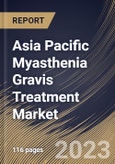The advent of specific blood tests has revolutionized MG diagnosis. These tests primarily look for antibodies directed against components of the neuromuscular junction, such as the acetylcholine receptor (AChR) or muscle-specific kinase (MuSK). These antibodies indicate an immune attack on the neuromuscular junction, aiding in MG diagnosis. Advanced neuroimaging, such as MRI and CT scans, can provide important information on thymic abnormalities in people with MG, such as thymoma or thymic hyperplasia. Additionally, these scans may aid in identifying other possible anatomical irregularities linked to MG.
The management of myasthenia gravis is primarily aimed at improving muscle function and alleviating symptoms. Medications like pyridostigmine enhance neuromuscular transmission, temporarily relieving muscle weakness and fatigue. Cholinesterase inhibitors are a cornerstone of MG treatment, helping patients maintain muscle strength. Immunosuppressive drugs, such as prednisone, azathioprine, mycophenolate, and methotrexate, control the immune system's overactivity in MG. They help reduce the severity of symptoms and minimize the need for higher doses of cholinesterase inhibitors.
With a rising population, especially in countries like China and India, there's a growing demand for healthcare services, leading to increased investments in hospitals, clinics, and medical facilities. These initiatives often involve infrastructure development, public health programs, and investments in research and development. As per the data from the Government of Australia, the country spent an estimated $241.3 billion on health goods and services in 2021–22 – an average of approximately $9,365 per person. Thus, increasing investments in Asia Pacific countries will help expand the regional market.
The China market dominated the Asia Pacific Myasthenia Gravis Treatment Market by Country in 2022 and would continue to be a dominant market till 2030; thereby, achieving a market value of $215.4 Million by 2030. The Japan market is registering a CAGR of 9.6% during (2023 - 2030). Additionally, The India market would showcase a CAGR of 10.9% during (2023 - 2030).
Based on End-use, the market is segmented into Hospitals, Clinics and Others. Based on Type, the market is segmented into Monoclonal Antibodies, Thymectomy, Cholinesterase Inhibitors, Chronic Immunomodulators, Rapid Immunotherapies and Others. Based on countries, the market is segmented into China, Japan, India, South Korea, Singapore, Malaysia, and Rest of Asia Pacific.
The market research report covers the analysis of key stake holders of the market. Key companies profiled in the report include AstraZeneca PLC (Alexion Pharmaceuticals, Inc.), Octapharma AG, Novartis AG, Pfizer, Inc., Allergan PLC (AbbVie, Inc.), F. Hoffmann-La Roche Ltd., GlaxoSmithKline PLC (GSK), Bausch Health Companies Inc., Kedrion S.p.A, and Zydus Lifesciences Ltd.
Scope of the Study
Market Segments Covered in the Report:
By End-use- Hospitals
- Clinics
- Others
- Monoclonal Antibodies
- Thymectomy
- Cholinesterase Inhibitors
- Chronic Immunomodulators
- Rapid Immunotherapies
- Others
- China
- Japan
- India
- South Korea
- Singapore
- Malaysia
- Rest of Asia Pacific
Key Market Players
List of Companies Profiled in the Report:
- AstraZeneca PLC (Alexion Pharmaceuticals, Inc.)
- Octapharma AG
- Novartis AG
- Pfizer, Inc.
- Allergan PLC (AbbVie, Inc.)
- F.Hoffmann-La Roche Ltd.
- GlaxoSmithKline PLC (GSK)
- Bausch Health Companies Inc.
- Kedrion S.p.A
- Zydus Lifesciences Ltd.
Unique Offerings
- Exhaustive coverage
- The highest number of Market tables and figures
- Subscription-based model available
- Guaranteed best price
- Assured post sales research support with 10% customization free
Table of Contents
Companies Mentioned
- AstraZeneca PLC (Alexion Pharmaceuticals, Inc.)
- Octapharma AG
- Novartis AG
- Pfizer, Inc.
- Allergan PLC (AbbVie, Inc.)
- F. Hoffmann-La Roche Ltd.
- GlaxoSmithKline PLC (GSK)
- Bausch Health Companies Inc.
- Kedrion S.p.A
- Zydus Lifesciences Ltd.








